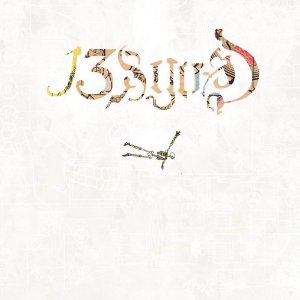Six years ago 13&God’s self-titled debut was the most adventurous collaboration to emerge from the acclaimed San Franciscan label Anticon. Lyricist Adam ‘Doseone’ Drucker and beatmaker Jel teamed up with members of Subtle to record with Markus and Micha Acher of German rock band The Notwist. Produced between Oakland and Weilheim, it was a unique ledger of fast raps and indie elegance, delivered with a top-dressing of cosmopolitan thirty-something longing. Now, Own Your Ghost delivers on 13&God’s promise, as well as on the whole sense of potential captured on Anticon’s earliest records.
As a seven-man band 13&God break more new ground than either The Notwist or Subtle alone. Over ten tracks they conjure the same cinematic ambience of the debut, with the acoustic guitar and piano of robust opener ‘It’s Own Sun’ billowing like veils caught in an evening breeze. The first vocal is Markus Acher’s, giving over to a palpitating glitch and breathy mantra from Drucker. The album’s theme is death. Or rather accepting death, then moving on to explore the process of creative, intelligent ageing. Songs like ‘Janu Are’ and ‘Et Tu’ share something of the quality of Zen death poems – apparently accepting your mortality means you can make warm, rocking songs that explore earthly existence with prescience and positivity. ‘Death Major’ rotates around the words "you are singular". You’re a once-in-a-lifetime person. Here we’re straight in with Doseone, his words skirting around Acher’s until boom: full-tilt frictionless lyrics delivered over a speedy tick. Couplets pop like smoke-filled bubbles as images flick past in locomotion.
‘Armored Scarves’ is a thematic sequel to the debut’s ‘Men of Station’, warm with resolve. Lyrically, Own Your Ghost developed as Acher selected sheets from Drucker’s pile, filtering the surrealist word-work though a voice blessed with the odd elegance of the non-native English-speaker. The song begins with chords strummed on nylon strings and the line "so life’s the colander", pronounced as you might pronounce "obstacle ender". The affirmative chorus, ‘these are troubled times and so / so dip your scarves in armour’, leads to Drucker’s most radical and outrageous vocal yet. He momentarily sings a two-note motif. This becomes the foundation for an ascending verbal collage, culminating in a multilayered all-band chant. As the voices rise a militaristic drum clatter snaps into life creating a tremendous sense of unity. 13&God are becoming masters of this mood, writing anthems that insulate against life’s small shocks. Listen to ‘Armored Scarves’ alone at night and watch as the room begins to shine. Listen to it with your arms around the person you love and feel their wings re-emerge.
For the last four years ‘Sure as Debt’ has been available on YouTube, as performed at the 2005 Melt festival in Ferropolis. After more than 36,000 hits and a litany of excited praise, it’s pleasing to hear how it has developed. Another Drucker-intensive lead, the lyrics are an aggressive rumination on art, debt and death, delivered over a bass pulse and bhangra beat. The guitar’s strings are struck beyond the nut to create percussive stabs as lyrics spiral off into spacey bloops. If the song channels a big idea it’s Schopenhauer’s notion that life is a loan from death, with sleep as the interest. But for all the profound talk, the beat’s big enough to kickstart a street-dance.
Own Your Ghost is a musical success, and diverse. ‘Death Major’ upholsters a fairly straightforward structure with sweeping strings, creating a song that could open the world’s coolest James Bond film. ‘Janu Are’ opens with woodwind, Drucker stalking with intent before a series of needling electronic shocks. By contrast the fuzzy ‘Oldage’ rolls along on a sunbeam, fit for a summertime mixtape. It’s led by Acher but a closing sample features Sylvia Plath saying "flies watch no resurrections in the sun", met by Drucker saying ‘what’s done is done’. This confirms his artistic link to the neurotic verse of the English canon. Nine years ago on Hemispheres he was a rapper. On Own Your Ghost he is a poet. If it wasn’t for the forget-me-nots you might mistake Plath’s lines (from ‘November Graveyard’) as having been written by Drucker:
Flower forget-me-nots between the stones
Paving this grave ground. Here’s honest rot
To unpick the heart, pare bone
Free of the fictive vein. When one stark skeleton
Bulks real, all saint’s tongues fall quiet:
Flies watch no resurrections in the sun.
And throughout, Acher’s choral phrasemaking is the perfect complement to Drucker’s aerobic verses. On the Subtle albums Drucker works through different voices and characters – the track ‘Midas Gutz’ from For Hero: For Fool is an obvious example – so it makes sense that his lyrics work best delivered in tandem with other singers. In 13&God both voices create a soothing kind of dream language that excites as it seduces. ‘Beat on Us’ features a riff that seems like language as pure rhythm, folding into the surrounding tones. Drucker has mastered his style, and with 13&God he finds his expressive zenith.
More than a decade ago Anticon was described as "an underground earthquake whose shockwaves will eventually reach us all". Back then it was a seeker’s pleasure to find strange songs from all the different artists. Some of the material had a bit of the laboratory about it, the word ‘experimental’ used to cover whimsy or wilful eccentricity. But since then we’ve had ranking bands like Why? and Clouddead, and in the last couple of years debuts from fully-formed acts such as Tobacco, Sun Lux, and Baths. Amidst all the productivity Own Your Ghost is a landmark release, the label’s apex and a high-water mark for all seven musicians. 13&God craft artful and idiosyncratic maps of the human heart. In their fertility the songs are like a selection of rare and precious metals glowing inside a case, and the album’s a great example of something you seldom hear: contemporary music creating the very emotion it needs to convey.


